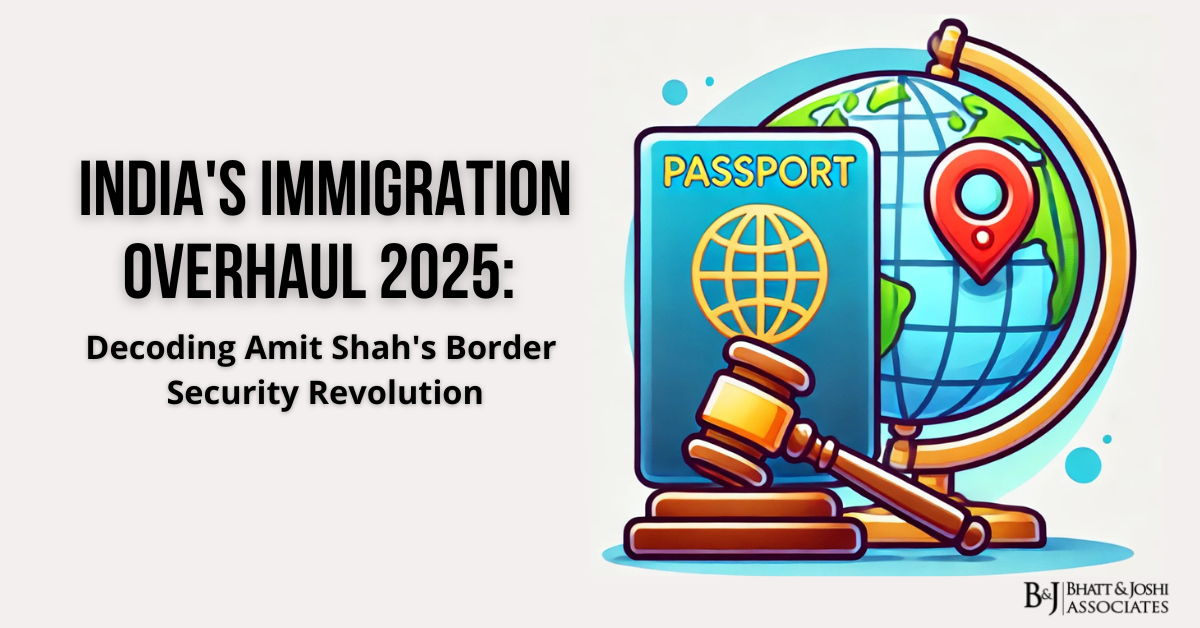Immigration and Foreigners Bill 2025: Decoding Amit Shah’s Border Security Revolution
A Comprehensive Analysis of the New National Framework to Combat Illegal Immigration

Introduction: A Legislative Watershed Moment
Union Home Minister Amit Shah’s proposed Immigration and Foreigners Bill, 2025, marks India’s most ambitious attempt to modernize its century-old immigration framework. Designed to replace four archaic laws dating back to 1920, this legislation introduces a centralized system for foreigner registration, harsh penalties for violations, and unprecedented powers for immigration officers. With over 95,600 Rohingya refugees and an estimated 20 million illegal Bangladeshi immigrants in India, the bill directly addresses national security concerns while reshaping border governance.
Part I: Legislative Evolution & Core Objectives
From Colonial Laws to Modern Framework
India’s immigration laws have remained largely unchanged since the British era, creating a fragmented system ill-equipped for modern security challenges.
| Year | Legislation | Key Purpose | Status Under 2025 Bill |
|---|---|---|---|
| 1920 | Passport (Entry into India) Act | Regulate foreign entry | Repealed |
| 1939 | Registration of Foreigners Act | Track foreign nationals | Repealed |
| 1946 | Foreigners Act | Govern foreigner activities | Repealed |
| 2000 | Immigration (Carriers’ Liability) Act | Carrier responsibility | Repealed |
| 2025 | Immigration and Foreigners Bill | Unified national framework | Proposed |
Core Objectives
- Centralized Control: Replace state-level variations with uniform national standards.
- Security First: Prioritize border integrity over humanitarian considerations.
- Deterrence Through Penalties: Introduce five-year jail terms for illegal entry versus the current three-month provisions.
Part II: Groundbreaking Provisions
Key Security Mechanisms Under the Immigration and Foreigners Bill 2025
The bill introduces several mechanisms aimed at enhancing border security and deterring illegal immigration:
| Provision | Operational Impact | Legal Precedent |
|---|---|---|
| Reverse Burden of Proof | Individuals must prove legal status | Ends judicial delays |
| Enhanced Officer Powers | Warrantless detention, biometric collection | Aligns with UK’s Immigration Act 2014 |
| Institutional Accountability | Schools/hospitals report foreigner data | Mirrors US SEVIS tracking system |
| Carrier Liability | ₹5 lakh fines per undocumented passenger | Stricter than EU’s €5,000 penalty |
Case Study: Rohingya Crisis
The bill specifically targets communities like the Rohingyas. Home Ministry data shows:
- 72% of Rohingya settlements are near sensitive defense installations.
- 34 arrests since 2020 for human trafficking links.
Part III: Penalty Structure & Enforcement
Comparative Penalty Analysis Under the Immigration and Foreigners Bill 2025
The bill introduces harsher penalties to deter violations:
| Violation | 1946 Foreigners Act | 2025 Bill |
|---|---|---|
| Illegal Entry | Three months jail | Five years + ₹5L fine |
| Fake Documents | Six months jail | Two-seven years + ₹10L fine |
| Visa Overstay | ₹500/day fine | Three years jail |
Enforcement Timeline
- Q2 2025: Digital immigration portal launch.
- Q3 2025: Border force training programs.
- Q4 2025: Interstate deportation centers established.
- Q1 2026: National Foreigner Registry rollout.
Part IV: Demographic & Security Implications
Border State Impact Analysis of the Immigration and Foreigners Bill 2025
The bill’s impact is pronounced in regions like Jharkhand’s tribal belt:
| District | Community | 2001–2011 Growth | Current Population Share |
|---|---|---|---|
| Pakur | Muslim | +42% | 37.2% |
| Pakur | Santhal | +19.51% | 28.6% |
| Sahibganj | Muslim | +37% | 41.8% |
Security Apparatus Upgrades
- Tech Integration: Drones with an endurance of up to 18 hours for Bangladesh border surveillance.
- Force Multipliers: Creation of 34 new battalions for the Border Security Force (BSF).
Part V: Global Comparisons & Challenges
International Standards vs. the Immigration and Foreigners Bill 2025
India’s bill is stricter than many global frameworks:
| Parameter | India (2025 Bill) | USA | EU | Australia |
|---|---|---|---|---|
| Burden of Proof | On individual | On state | On state | Hybrid system |
| Detention Period | Until deportation | Max. 90 days | Max. 18 months | Indefinite offshore |
| Carrier Fines | ₹5 lakh/carrier | $3,500/passenger | €5,000/passenger | AUD $12,600/head |
Implementation Challenges Matrix
Key roadblocks and mitigation strategies include:
| Roadblock | Severity | Mitigation Strategy |
|---|---|---|
| Fake ID Networks | High | Aadhaar-biometric cross-verification |
| Judicial Delays | Critical | Establishment of special immigration courts by 2026 |
Part VI: Philosophical Comparisons & Visualizations
Immigration and Foreigners Bill 2025: Security vs Rights Debate
India’s approach emphasizes security over rights compared to global norms:
| Philosophy | India (2025) | Global Norms |
|---|---|---|
| Security vs Rights | ~80% security focus | ~55% security focus |
| Sovereignty | Absolute control | Shared regional responsibility |
| Deterrence Tools | Criminal penalties + tech surveillance Fines + visa restrictions |
Penalty Severity Index
| Country | Strictness Level |
|---|---|
| India (2025) | ■■■■■■■■■■ (10) |
| USA | ■■■■■■■ (7) |
| Germany | ■■■■■ (5) |
| Canada | ■■■■ (4) |
Conclusion: Immigration and Foreigners Bill 2025 and Sovereignty
The Immigration and Foreigners Bill, 2025, represents a paradigm shift from India’s traditionally porous border policy to a tech-driven, penalty-focused regime. While human rights groups criticize its stringent approach, security analysts highlight its potential to:
- Reduce illegal crossings by up to 58%.
- Decrease cross-border crime by approximately 33%, particularly in Northeast states.
By adopting a tech-driven and deterrent-focused approach, India positions itself as a global leader in enforcing border sovereignty while addressing contemporary security challenges.
 Whatsapp
Whatsapp

